Bachelor of Traditional Chinese Medicine
Apply Now
| Duration | 4 years full-time Part-time available for Domestic students |
|
| Study Mode | Mixed Combines on-campus and online learning |
|
| Campus Location | Haymarket, Sydney Students outside Sydney can do the on-campus learning via intensive study blocks |
|
| Clinical Practicum | 900 hours Most of these hours are completed at our on-campus Teaching Clinic |
|
 | Award Abbreviation | BTCM |
 | Upcoming Intakes | Each February, June, August and December |
The Bachelor of Traditional Chinese Medicine (BTCM) is a four-year undergraduate degree in the discipline of Traditional Chinese Medicine.
The course provides a comprehensive foundation in the theory and practice of traditional Chinese medicine (TCM) including acupuncture, Chinese herbal medicine, Chinese herbal dispensing, biomedical sciences, and the role of a TCM practitioner in the Australian health system. It includes a major clinical training component and is accredited by the Chinese Medicine Board of Australia in all divisions of registration.
Many graduates obtain professional registration from the Chinese Medicine Board of Australia and then enter private practice as primary health practitioners, either through self-employed or at a larger TCM or multidisciplinary clinic. Others may undertake Chinese medicine research, become involved in education, join herbal or pharmaceutical companies, engage in consultancy, or work in other healthcare agencies.
SITCM actively engages with private clinics to introduce our students and graduates to potential job opportunities.
The Bachelor of TCM is fully accredited by the Chinese Medicine Board of Australia (CMBA) and Tertiary Education Quality and Standards Agency (TEQSA). It is also registered on CRICOS for delivery to overseas students.
We collaborate with Australia’s six TCM-focused professional associations:
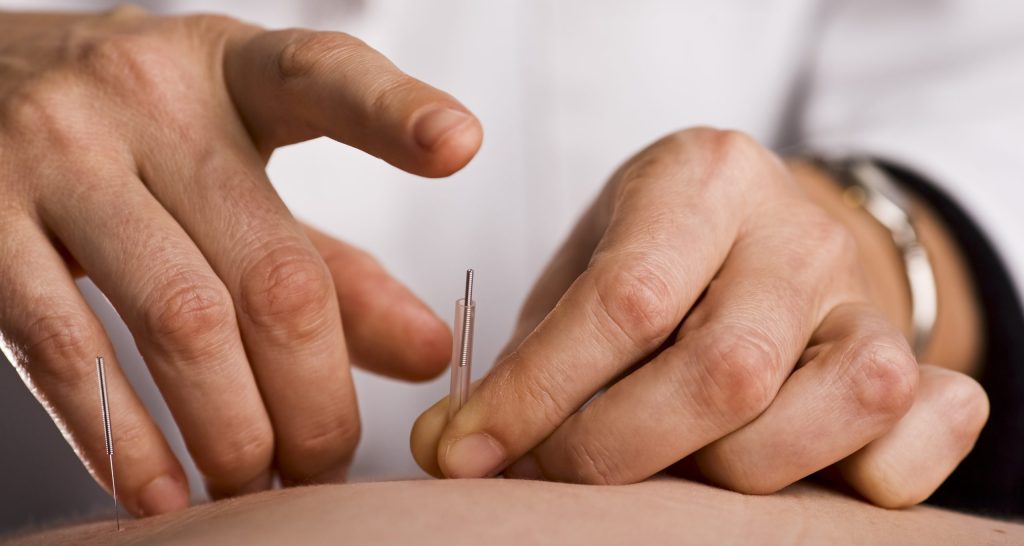
The degree normally takes four years to complete full-time, unless a student has received credit for prior learning. Domestic students may complete the degree through part-time study lasting up to 10 years.
A full-time student will study in Semester 1 (February to June) and Semester 2 (August to December) of each year. In these periods, students generally have classes on two weekdays per week. Students must also attend rostered sessions in SITCM’s Teaching Clinic, with a time commitment that increases progressively from 30 hours in total for Semester 2 of Year 1 to 250 hours in total for Semester 2 of Year 4.
Each unit’s delivery mode is chosen by the Dean and takes into account student feedback collected at the end of the previous semester. In some units, lectures have been specially designed for students to complete at their own time and pace on our online learning platform. Other lectures, and all tutorials, are delivered as classes. These classes may be held on campus or online, depending on what is considered most beneficial to student learning in the given unit.
SITCM offers flexible learning arrangements to students who reside outside Sydney, whereby they can generally complete their on-campus learning requirements through three weeks of intensive study per semester.
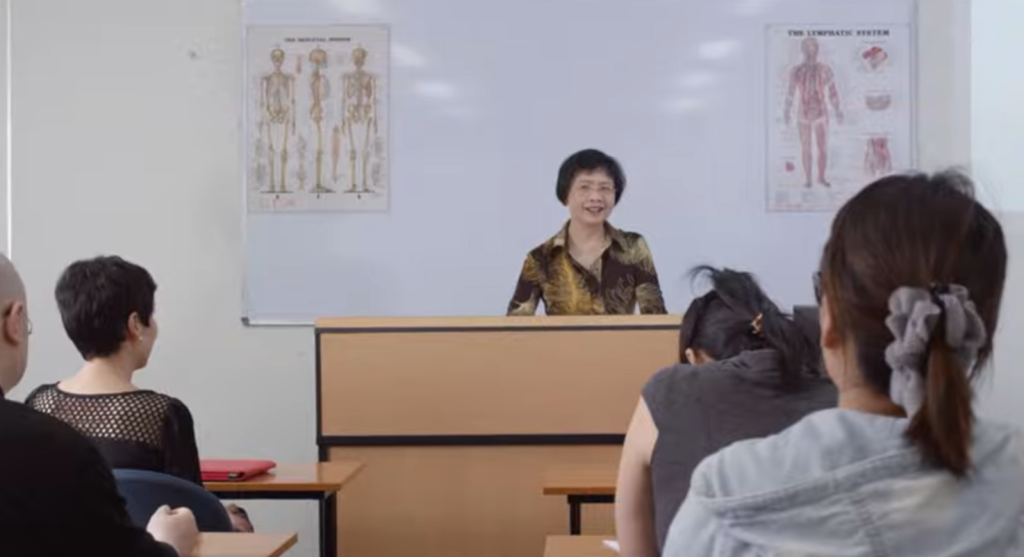
A minority of units are available for completion in the summer or winter holiday period (in addition to their regular delivery in Semester 1 or Semester 2 of each year) subject to student demand.
This degree is divided into eight semesters, with full-time students studying four units per semester. For details about specific units, please see our Course Structure page.
SITCM students can also attend an optional China study tour delivered by the Jiangxi University of Traditional Chinese Medicine in their summer or winter holidays.
All units in this degree can be categorised into one of the six below knowledge areas:
Theoretical Paradigms
The BTCM provides students with education in the theoretical paradigms of traditional Chinese medicine including its terminology, history, theoretical orientation, principles and diagnosis. These studies will provide a firm foundation, from which students will be able to collect and interpret information in a clinical setting.
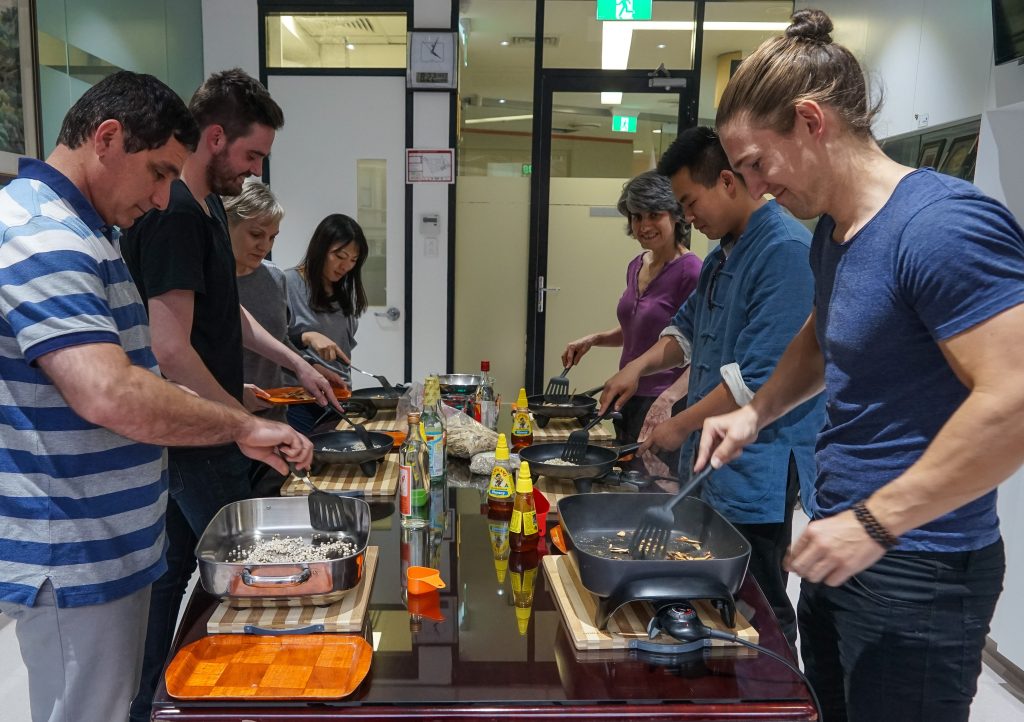
Biomedicine
Students will study basic and biomedical sciences such as anatomy, biochemistry, histology, physiology, pathophysiology, microbiology, pathology, clinical diagnosis and pharmacology in western medicine. These studies aim to provide an understanding and appreciation of the theoretical background of modern biomedicine in order to establish a common ground for communication with the Australian healthcare system to enable practitioners to interpret the biomedical viewpoint, and to encourage the application of scientific knowledge in clinical practice.
Herbal Medicine & Acupuncture
Students will study the full range of modalities of Chinese medicine which provide an understanding of the theoretical aspects specific to acupuncture and Chinese herbal medicine/dispensing, including compliance with herbal restrictions under the SUSMP and CITES, as well as practical training in the safe application of these therapeutic methods. Students will study classical Chinese medicine literature to provide an understanding and appreciation of the sources of many of the concepts and therapeutic approaches used in contemporary Chinese medicine.
Clinical Studies
Clinical Chinese medicine studies will provide a foundation in TCM internal medicine, TCM traumatology, TCM gynaecology, TCM paediatrics and dermatology. This will provide students with theoretical and practical skills in the diagnosis, differentiation and clinical management of a wide range of health disorders using acupuncture and Chinese herbal medicine.
Clinical Training
Clinical training provides practical application of the theories of Chinese medicine and biomedicine for the management of a wide range of health disorders using acupuncture and Chinese herbal medicine, as in the operation of a Chinese medicine clinic or dispensary. Students will develop an understanding of their professional identity and other professional roles in the healthcare team and develop approaches to become collaborative interprofessional team members. This learning occurs in real clinics (i.e., at SITCM’s Teaching Clinic and designated external clinics). For more information about clinic training, please see our Clinic Practicum page.
Professional & Practice Issues
Students will study professional and practice issues that include communication, ethics, legal responsibilities, cultural safety, cultural determinants of health, practice management, small business management, and research methods. This will assist students in a range of areas needed for the effective operation of an independent practice in Chinese medicine and in their ongoing professional development. This aspect of the course is integrated systematically throughout the teaching and learning process to assist in the development of skills required for an Australian healthcare practitioner to operate a successful private practice.
This degree’s learning outcomes are aligned to the requirements of the Australian Qualification Framework Level 7 and to the professional capabilities of Chinese medicine accreditation standards. At the conclusion of the Bachelor of TCM, graduates will be able to:
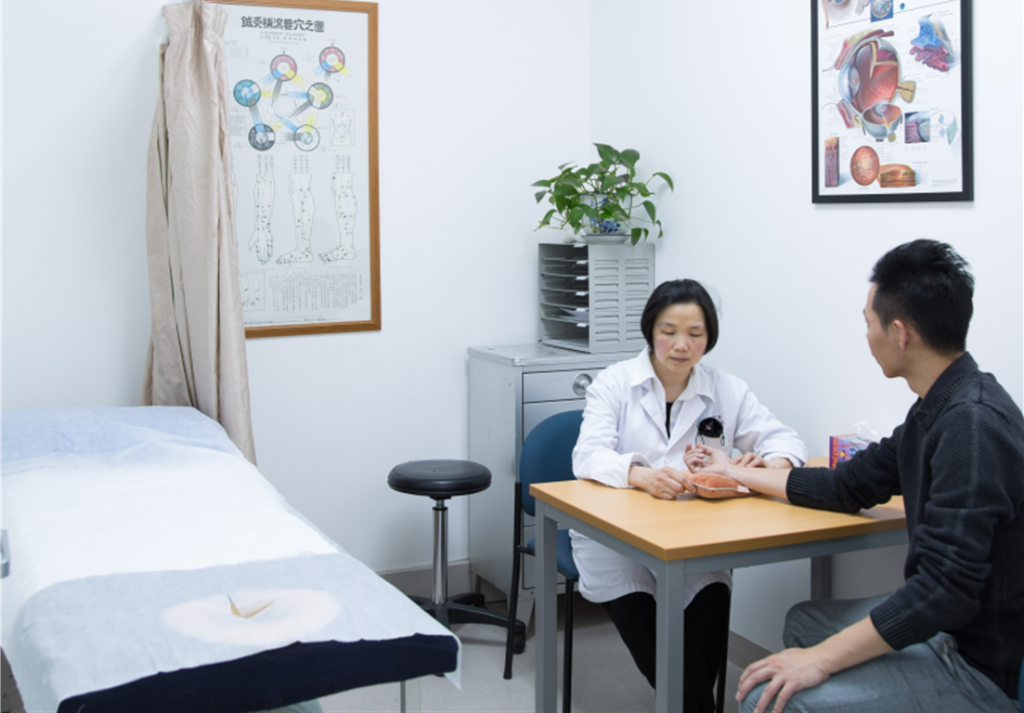
This page is designed to list the BTCM’s tuition fees for a specific year. For other important fee information, including how fees must be paid and by when, please visit our FEE Information page.
Tuition fees cover the charges for tuition administration. They do not cover the cost of accommodation, living expenses, textbooks, uniforms, stationery, or equipment. Tuition fees are subject to change from year to year in accordance with the Fees Policy and Procedure.
2025 tuition fees are as follows:
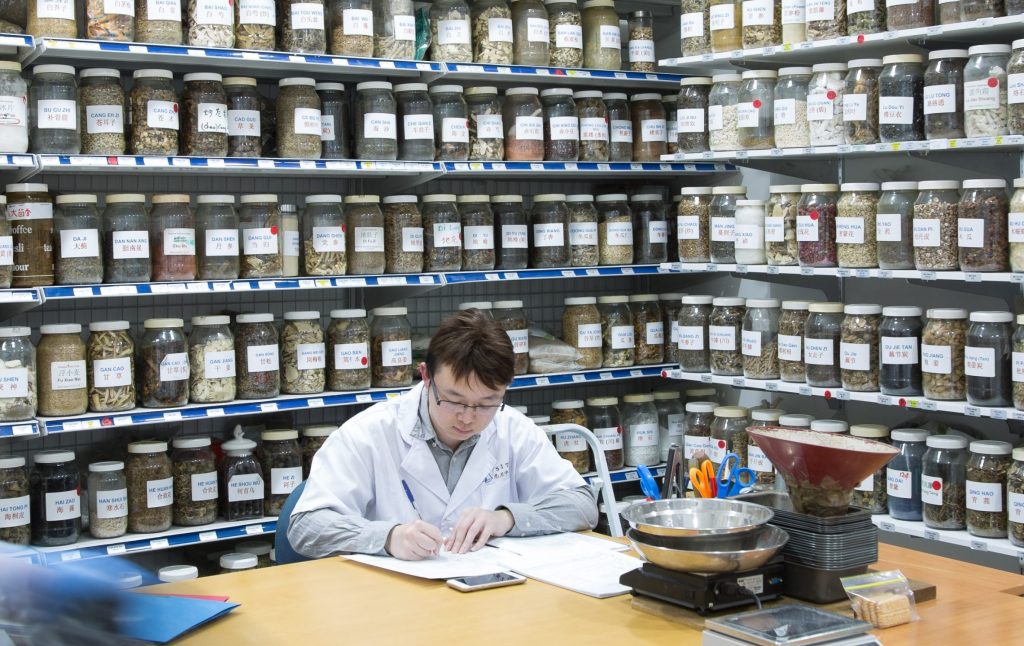
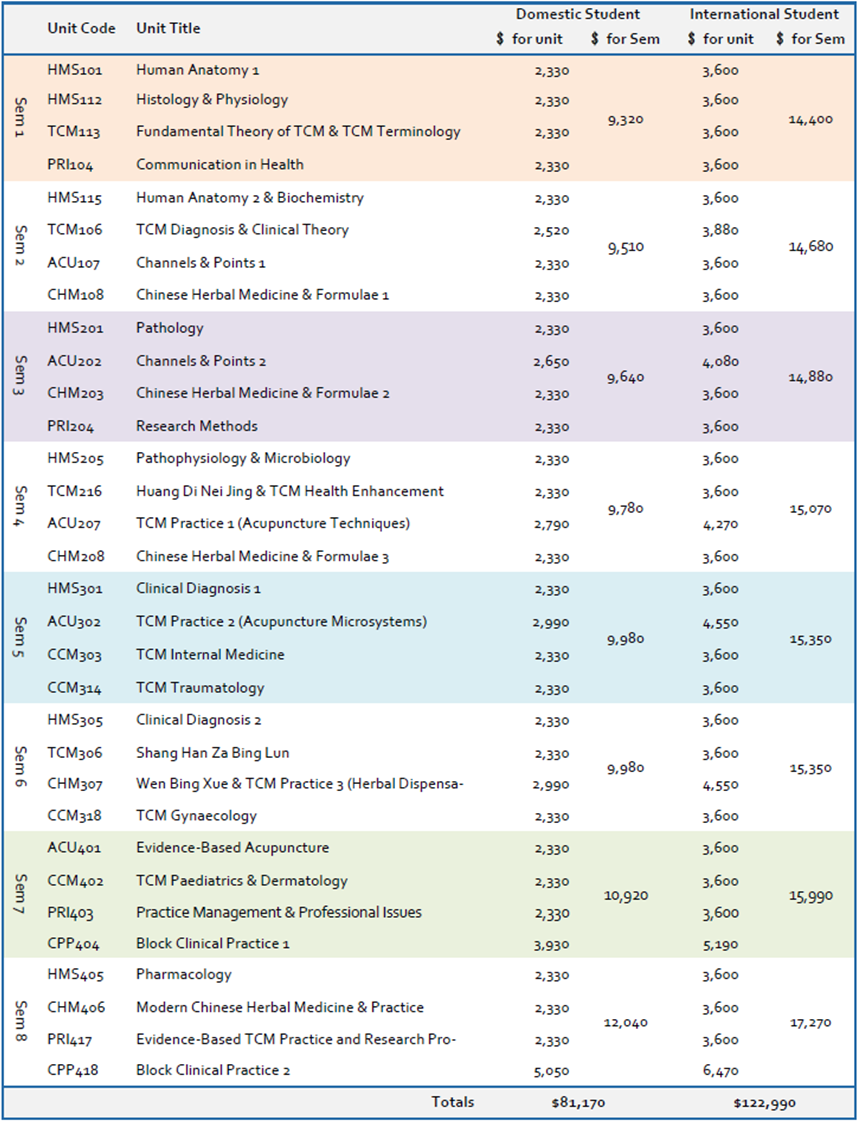
For admission to the Bachelor of Traditional Chinese Medicine (BTCM), applicants must meet all three of the following requirements:
Applicants must satisfy at least ONE of the following to fulfil the education requirement:
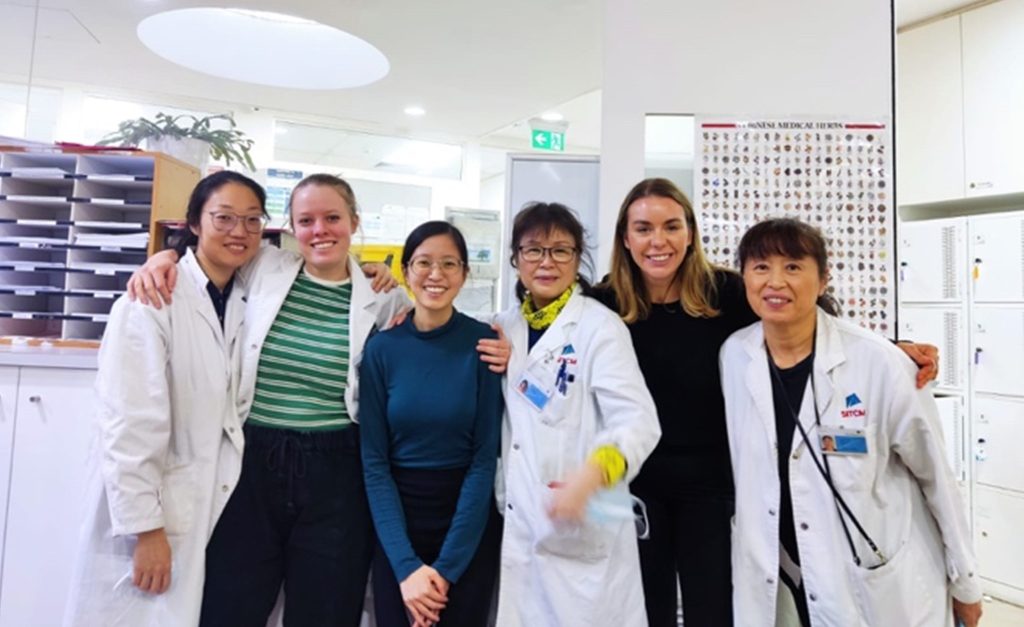
Alternative Admissions
Applicants who do not meet any of the above education requirements may gain entry to the course by meeting one of the following alternative admission requirements:
Alternative admission applicants must also pass an interview with the Dean, who will assess their capacity to undertake higher education study. Applicants may be required to commence the course through conditional enrolment which involves a reduced number of units in the first semester of study and the close monitoring of their progress at the conclusion of each semester in the first year of study.
Applicants need to demonstrate English language proficiency by providing evidence of ONE of the following:
| English Language Test | Minimum Requirement |
|---|---|
| IELTS Academic | 6.5 overall (minimum 6.0 in each subtest) |
| TOEFL Internet-based Test (iBT) | 58 overall (minimum 50 in all communicative skills) |
| Pearson Test of English (PTE) Academic | 90 overall (minimum 21 in writing) |
| C1 Advanced Cambridge (formally known as CAE-Cambridge Advanced English) | 176 overall |
| C2 Proficiency Cambridge (formally known as CPE-Cambridge Proficiency English) | 176 overall |
| Special Tertiary Admissions Test (STAT) Multiple Choice | 155 in the verbal (critical) reasoning component |
| Qualification | Minimum Requirement |
|---|---|
| International Baccalaureate Diploma (IB) | Grade 4 in either English B (at higher level), English A (language and literature at standard or higher level) or English A (literature at standard or higher level) |
| United Kingdom GCE A Levels | C grade in at least one Humanities subject at AS or A2 level |
| Singapore-Cambridge GCE A Levels | C grade in at least one Humanities subject at H1 or H2 level |
| Sijil Tinggi Persekolahan Malaysia (STPM) | C pass in 920 Literature in English |
| Hong Kong Diploma of Secondary Education (HKDSE) | Level 4 in English Language or Literature in English |
| German Arbitur | 3 (on a 6-point scale) or 8 (on a 15-point scale) in Advanced Level English (AF) |